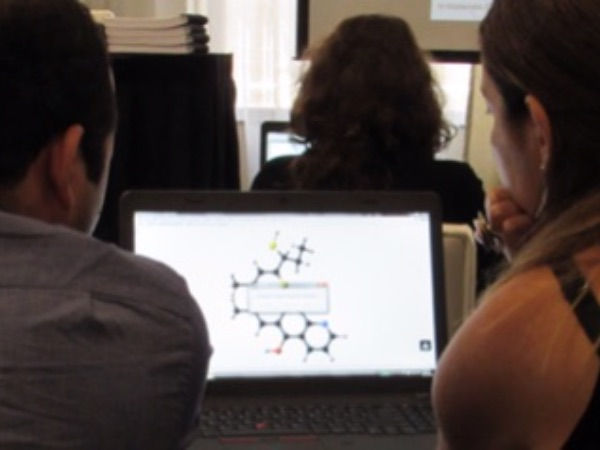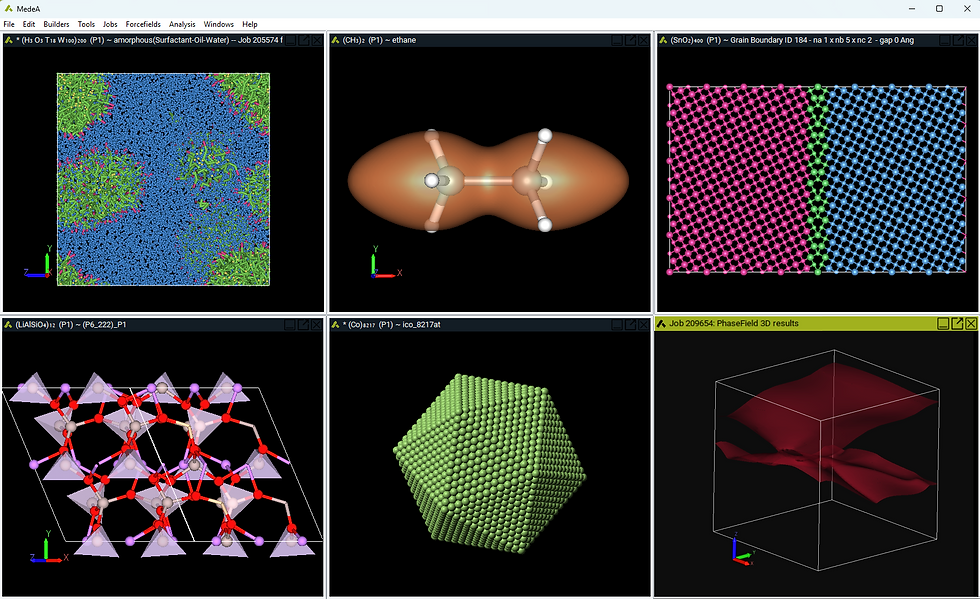2021 MedeA User Group Meeting: Training Registrations are Now Open!
- Katherine Hollingsworth
- Oct 6, 2021
- 3 min read
Training and Demonstrations
Tuesday Training Sessions
The MedeA User Group Meeting features an online series of training and demonstration sessions with Materials Design Team members on Tuesdays in October.
The training sessions will provide an exclusive unique opportunity to learn about the MedeA Environment and its exciting new capabilities. Session participants will be able to interact directly with Materials Design researchers and developers. Topics will relate to the presentations given by the plenary speakers.
Open to everyone (customers and guests)
Trials of selected modules will be available after the training sessions
Spaces for training will be limited - so register early
Upcoming Training Sessions Classical Forcefield-based Methods Instructors: Dr. Marianna Yiannourakou and Dr. Jörg-Rudiger Hill In this training session we will focus on property prediction using classical forcefield-based methods. We will go over examples that will allow us to discuss:
building of models (atomistic and coarse-grained),
creation of re-usable workflows,
job control,
analysis of results
MedeA VASP and Battery Applications Instructor: Dr. René Windiks
In this training René will show how you can apply MedeA VASP in combination with MedeA building tools to calculate voltage profiles of electrode materials and to assess the electrical conductivity at electrode/electrolyte interfaces.
Machine-Learned Potential Capabilities in MedeA Instructor: Dr. David Reith In this training session, we provide an overview of MedeA's new machine-learned potential capabilities. We will demonstrate the use of MedeA LAMMPS with machine-learned potentials (MLPs) as supplied with MedeA. We will also introduce the new machine-learned potential generator (MLPG) of MedeA, allowing the user to create their own MLP independently. Finally, we will discuss guidelines for constructing a training set, performing DFT calculations for all structures included in the training set, and efficiently storing relevant data for use with the MLPG. This training session will enable users to perform LAMMPS calculations with MLPs and create and apply their MLPs.
Live Training and Demonstration Dates
Agenda:
Classical Forcefield-Based Methods:
Tuesday, October 12
8:00 AM PDT / 11:00 AM EDT
16:00 BST / 17:00 CEST / 20:30 IST
MedeA VASP and Battery Applications:
Tuesday, October 26
8:00 AM PDT / 11:00 AM EDT
16:00 BST / 17:00 CEST / 20:30 IST
Machine-Learned Potential Capabilities in MedeA:
Tuesday, November 2
8:00 AM PDT / 11:00 AM EDT
16:00 BST / 17:00 CEST / 20:30 IST
Instructors

Dr. Jörg-Rüdiger Hill
Jörg-Rüdiger Hill received his PhD in chemistry from Humboldt University in Berlin by applying ab initio methods to zeolite models and developing forcefields for zeolites. He joined Biosym Technologies in San Diego working on the development of forcefields and doing contract research in materials science. He also headed the development of a data management system for combinatorial materials science which was done in collaboration with industrial partners. In 2004, Jörg co-founded a software company that provides modeling software for materials research. There, he served as R&D Director and Managing Director and was responsible for the design and implementation of a materials simulation platform. With Materials Design, Jörg is deeply involved in contract research and software development. Jörg is the author of more than 30 scientific papers, book chapters and a book on materials modeling.

Dr. Marianna Yiannourakou
Dr. Marianna Yiannourakou is the Director of Product Management at Materials Design. Marianna is an experienced simulator of fluids and soft matter, and is a leader in the creation of innovative, high-quality software for property prediction. Marianna holds a Chemical Engineering PhD from the National Technical University of Athens and is widely published in fluid and condensed matter simulation.

Dr. David Reith
Dr. David Reith is an experienced applications and research scientist at Materials Design. Together with his colleagues of the support team he helps users maximize the benefits of modeling and simulation in their research. In addition, David is involved in contract research projects and is active in the development of the MedeA Environment.
David was awarded his PhD degree by the University of Vienna working with Prof. Raimund Podloucky and Prof. Stefan Müller on the vibrational properties and configurational entropies of materials, as obtained from cluster expansion and ab initio calculations. David's academic background and expertise is built on the development and application of ab initio based simulations techniques for materials science.

Dr. René Windiks
He is an author of scientific papers employing density functional theory, a Science & Support Specialist and Battery Industry Lead at Materials Design. Prior to his appointment at Materials Design, he worked at the Paul Scherrer Institute, which has one of the major battery research laboratories in Europe. With a background in chemistry and physics, he is an expert in the computational design of materials, superconductors and environmentally friendly pigments. He was awarded a PhD in physical chemistry from the Humboldt University of Berlin in 2000.






Comments